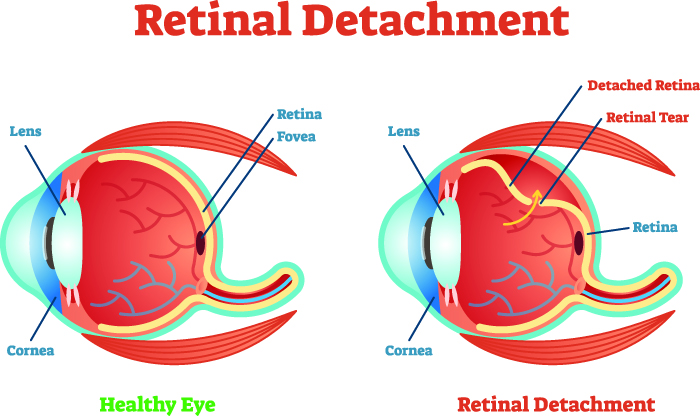Retinal Detachment Diagnosis & Treatment in MRC Nagar, Chennai
Retinal detachment occurs when the retina is separated from your eye's choroid, the vascular layer of the eye. When your retina is detached, photoreceptors fail to receive oxygen and nutrition from the choroid leading to permanent damage and blindness. Seek immediate medical attention by visiting any of the best ophthalmology hospitals in Chennai if you experience any sudden changes in your vision.

What causes retinal detachment? What are the types?
- Rhegmatogenous: This is the most common type, and results from a retinal tear or when the vitreous gel that fills your eyeball shrinks and separates from your retina. Eye injuries, surgery or nearsightedness may also be a reason for retinal detachment.
- Tractional: It occurs due to the scarring that pulls the retina away from the eye. It is commonly seen in people with diabetes because it leads to retinal vascular damage.
- Exudative: The common causes of exudative detachment include leakage and swelling of blood vessels because of an eye injury, inflammatory disorders or age-related macular degeneration.
What are the symptoms of retinal detachment?
Usually, the retina detaches, causing no pain. The retina may tear before detachment. So, consult the best ophthalmologist near you for an immediate fix with laser surgery before it fully detaches. However, below are some of the symptoms that appear before detachment:
- The sudden appearance of new floaters (tiny flecks in your vision)
- Flashes of light in peripheral vision
- Blurred vision in the affected eye
- Partial loss of vision, seems like a veil or shadow over your visual field
Who is at a risk of retinal detachment?
Risk factors for retinal detachment include:
- Aging, as detachment is more commonly observed in people aged 50 or above
- Family history of retinal detachment or tears
- Axial myopia can increase strain on the eyes
- Complications from eye surgeries like cataracts, glaucoma
- Other eye diseases or disorders, including retinoschisis, posterior vitreous detachment, lattice degeneration, diabetic retinopathy
When do you need to consult a doctor?
As a detached retina does not heal on its own, consult the best ophthalmology doctors near you if you observe any sudden change in your vision. The doctor will examine the eye and may recommend eye tests to diagnose retinal detachment. A retinal examination is performed to check the back of your eye and retina to look for tears and detachment. The blood flow throughout the eye may also be checked.
Request an appointment at Apollo Spectra Hospitals, MRC Nagar, Chennai.
Call 1860 500 2244 to book an appointment.
What are the treatment options for retinal detachment?
Consult and discuss with the best ophthalmologist near you what type of surgery is suitable for you.
- Laser therapy or cryopexy
If a tear in your retina has been diagnosed, your doctor may perform specific procedures called photocoagulation with the help of a laser or a cryopexy, which is a method of freezing with intense cold to seal a tear. The resulting scarring from a laser or cryopexy affixes your retina to the back of your eye. - Scleral buckling
For severe detachments, doctors may recommend scleral buckling. The procedure involves scleral indentation with a silicon-like band. This band helps place the retina in its original position. However, it is not suitable for giant retinal tears or ocular trauma. - Vitrectomy
Vitrectomy is another treatment option used for treating giant tears. The procedure involves complex equipment to remove the abnormal vascular tissue.
How can I prevent retinal detachment?
You cannot totally prevent a retinal detachment. However, one can lower the risk by taking specific measures such as:
- Get regular eye examinations done as early detection can prevent loss of vision
- Use protective wear when playing sports or indulging in any risky activities
- Having control over high blood pressure and diabetes helps maintain healthy blood vessels in your retina.
Conclusion
Retinal detachment is a vision-threatening condition that requires early surgery. The key to successful reattachment is early detection. So, get eye examinations done regularly at the best ophthalmology hospital in Chennai.
After the surgery, your eye may be swollen, red or tender for several weeks, and it may take several months to restore vision. Sometimes, patients, particularly those with chronic retinal detachment, do not regain any vision if there is any damage to the macula.
Surgery complications after reattachment include infection or bleeding in the eye. It also increases pressure inside your eye, leading to glaucoma and cataract.
Yes, there is a possibility of again getting a detached retina after the surgery. If this is the case, you may need another surgery.
Symptoms
Our Doctors
DR. M SOUNDARAM
MBBS, MS, FCAEH...
| Experience | : | 8 Yeras Experience |
|---|---|---|
| Speciality | : | Ophthalmology... | Location | : | Alwarpet |
| Timings | : | Available by prior a... |
DR. UMA RAMESH
MBBS, DOMS, FRCS...
| Experience | : | 33 Yeras Experience |
|---|---|---|
| Speciality | : | Ophthalmology... | Location | : | Alwarpet |
| Timings | : | Sat : 12:00 PM to 1:... |
DR. MANOJ SUBHASH KHATRI
MBBS, DO, DNB, FICO(...
| Experience | : | 15 Yeras Experience |
|---|---|---|
| Speciality | : | Ophthalmology... | Location | : | Alwarpet |
| Timings | : | Available by prior a... |
DR. SRIPRIYA SANKAR
MBBS, Madras Medical...
| Experience | : | 30 Yeras Experience |
|---|---|---|
| Speciality | : | Ophthalmology... | Location | : | Alwarpet |
| Timings | : | Tue, Thur: 05:00 PM ... |
DR. PRATIK RANJAN SEN
MBBS, MS, DO...
| Experience | : | 23 Yeras Experience |
|---|---|---|
| Speciality | : | Ophthalmology... | Location | : | Alwarpet |
| Timings | : | ON CALL... |
DR. MEENAKSHI PANDE
MBBS, DO, FRCS...
| Experience | : | 27 Yeras Experience |
|---|---|---|
| Speciality | : | Ophthalmology... | Location | : | Alwarpet |
| Timings | : | Available on prior a... |
DR. ASHOK RANGARAJAN
MBBS, MS (OPHTHAL), ...
| Experience | : | 20 Yeras Experience |
|---|---|---|
| Speciality | : | Ophthalmology... | Location | : | Alwarpet |
| Timings | : | Mon, Wed, Fri : 6:00... |
DR. SAPNA K MARDI
MBBS, DNB (Opthal)...
| Experience | : | 30 Yeras Experience |
|---|---|---|
| Speciality | : | Ophthalmology... | Location | : | Alwarpet |
| Timings | : | Tue, Thur : 10:00 AM... |
DR. SRIKANTH RAMASUBRAMANIAN
MBBS, MS (Ophthal), ...
| Experience | : | 14 Yeras Experience |
|---|---|---|
| Speciality | : | Ophthalmology... | Location | : | Alwarpet |
| Timings | : | Mon, Wed, Fri | 10... |
Our Top Specialities
NOTICE BOARD
CONTACT US
CONTACT US
 Book Appointment
Book Appointment











.svg)
.svg)
.svg)
.svg)








